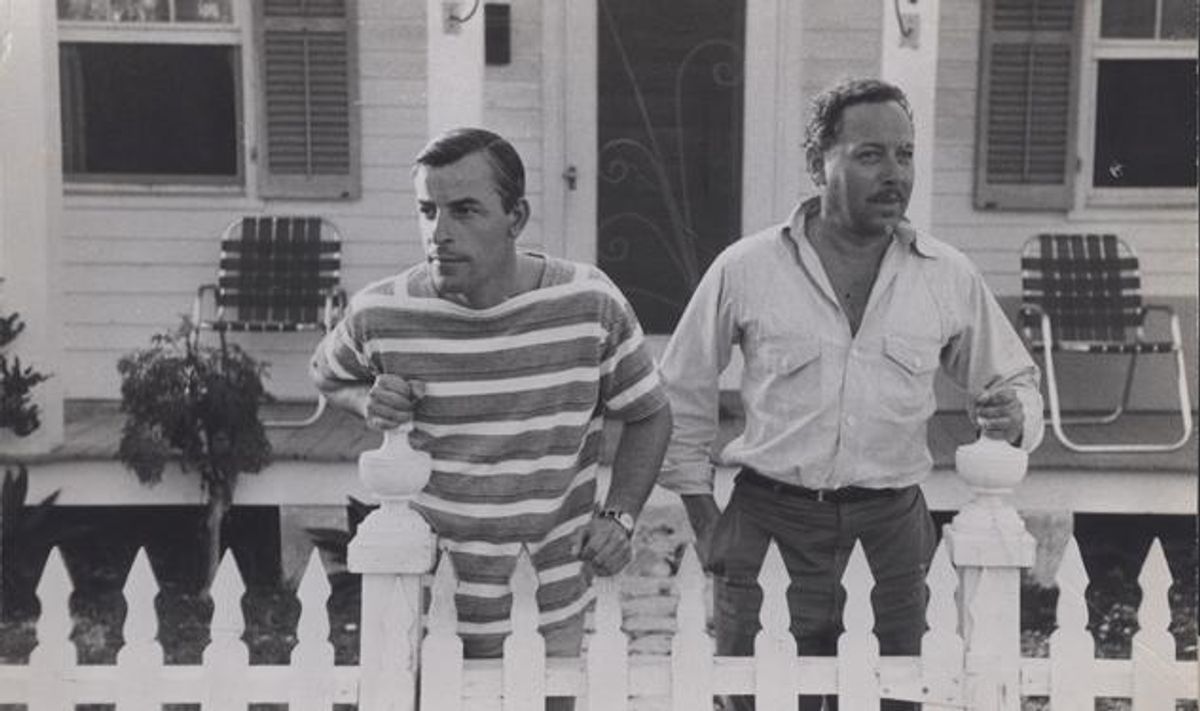Key West
Key West, 1979: The Dark Bright Rises

Tennessee Williams was the gay grandfather of Florida's southern isle
February 21 2013 4:46 PM EST
February 17 2017 11:43 PM EST
By continuing to use our site, you agree to our Private Policy and Terms of Use.

Tennessee Williams was the gay grandfather of Florida's southern isle
(Williams (R) with Merlo; the caption reads, "Having a drinkie-pie at the Bamboo Room in Key West.)
By 1979, Tennessee Williams was embarking on his fourth decade as one of Key West's famous faces.
Notable writers, artists, and actors had come through before -- painter Winslow Homer, writer Ernest Hemingway, and poet Robert Frost trekked through the islands, and Gloria Swanson started stomping the grounds when she was a child -- but it was Williams, sizzling in the mid-century for both combustible plays like A Street Car Named Desire and Cat on a Hot Tin Roof but also their film adaptations, that really gave the so-called Conch Republic its gay cred.
When not in New York City, it was the Southernmost Point where Williams and Frank Merlo, his lover of 14 year, lived their well-publicized lives. That is, until 1963, when Merlo, with whom Williams quarreled and reconciled over a steady stream of drugs and drink, died of lung cancer.
It was Williams' relatively open sexuality and Key West's reputation for being liberal that inspired hundreds of other homosexuals to flock south and turn the island into one of the nation's first and most enduring gay destination. If Palm Springs' LGBT path was paved by Rock Hudson, Williams is the gay grandfather of Key West. And he wasn't always happy about that.
"That's because a couple of gay magazines publicized this place as if it were the Fire Island of Florida. It isn't. One Fire Island is quite enough," he said on in May 1979, five months after he and friend Dotson Rader were attacked in an anti-gay hate crime that came after his house was burgled and his gay gardener was shot in his backyard, allegedly over a drug dispute. People magazine, which back then spent a lot of time raking gay muck with little sympathy for their subjects, wrote, "Police theorize that Williams' gardener--a bejeweled eccentric fond of shrieking 'I am a sick woman'--was murdered by men looking for a stash of cocaine."
Crime, particularly anti-gay incidents, were on the rise, and while the Williams's attack was the most high-profile and most dramatic, the most violent were preceded by a local Baptist Rev. Morris Wright newspaper ad declaring, "If I were the chief of police, I would get me a hundred good men, give them each a baseball bat and have them walk down Duval Street and dare one of these freaks to stick his head over the sidewalk."
The ad went on: "That is the way it was done in Key West in the days I remember and love."
Speaking about his and the other assaults, Williams told People that the ad and the gay press attracted violent "punks" but it would soon pass: "[The press] attracted the wrong sort of people here: the predators who are looking for homosexuals. I think the violence will be gone by next year." He was right.
The days Rev. Wright so revered were long gone and, in November of that year, a former teacher named Richard A. Heyman was elected to the Key West City Commission, making him one of the nation's first openly gay elected officials. He then became one of the nation's first openly gay mayors four years later, ushering in a new era for Key West and its LGBT denizens, cementing the town's place as a reliable go-to for gay travelers: a fitting legacy for a man who migrated south from Ohio, and a remarkably rapid evolution for the tiny island. It was darkest before dawn as the anti-gay elements were swept away and Key West lived up to its motto: One Human Family.
Sexy MAGA: Viral post saying Republicans 'have two daddies now' gets a rise from the right